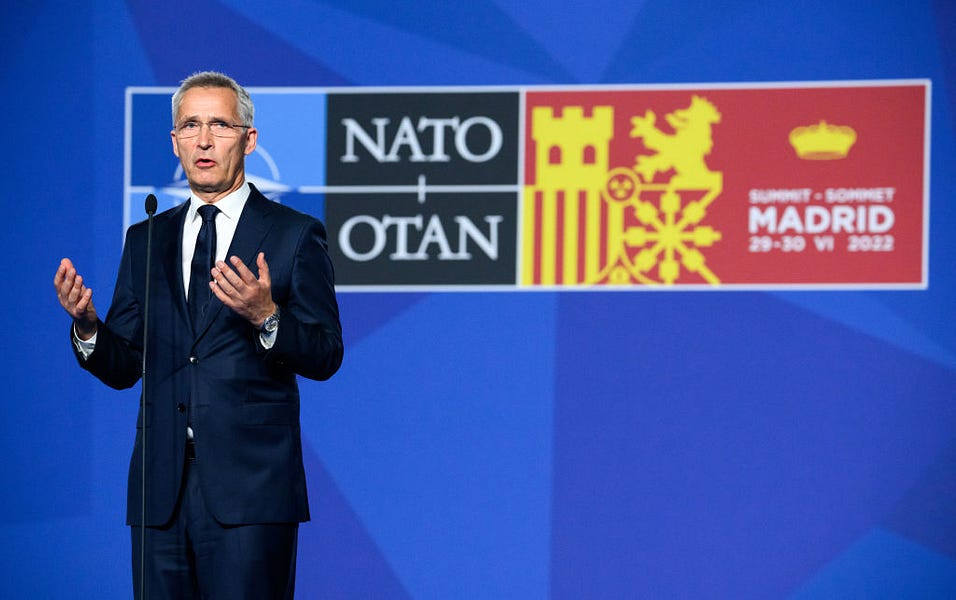A new flashpoint between NATO and Russia’s new expansionism flared up after Lithuania banned the transit of sanctioned goods from Russia to Kaliningrad, its exclave on the Baltic Sea, as part of the EU’s sanctions regime that took effect on June 17. Russia called Lithuania’s actions “hostile” and threatened “serious” consequences.
Undeterred, Lithuania this weekend blocked an EU motion that would have nullified the restrictions. Vilnius said that the EU must not succumb to Russian pressure and compromise on its sanctions package.
NATO leaders meeting in Madrid this week should back up Lithuania’s move to put Russia on the defensive. As a larger strategy, NATO should follow Lithuania’s lead of pressuring Moscow and calling out Moscow’s empty threats.
The Kremlin has already responded to Lithuania’s restrictions with information warfare and cyber subterfuge. On Monday, a Russian-speaking hacking group known as Killnet claimed responsibility for part of what Lithuania’s Defense Ministry calls an “intense, ongoing” cyberattack against government and private websites.
This cyberattack tracks with Russia’s Ministry of Defense Spokeswoman Maria Zakharova’s warning that Russia’s response would be “not diplomatic, but practical.” Kremlin spokeswoman Dmitry Peskov was similarly critical of the transit restrictions, calling them “illegal.”
But the restrictions are in strict accordance with EU law. Lithuania blocked only the transit of EU-sanctioned goods, like “metals, coal, construction materials, and high-technology products to the Russian sea port.” Lithuania’s Foreign Ministry issued a statement Monday saying that “the transit of passengers and non-sanctioned goods to and from the Kaliningrad region through Lithuania continues uninterrupted.”
The Kremlin threats come as Putin is increasingly open about his expansionism. On June 9, in a new justification for Russia’s war on Ukraine, Putin drew an analogy with Peter the Great’s 21-year war with Sweden. He said: “Clearly, it fell to our lot to return and reinforce [ex-Russian lands] as well.” One week later, at the St. Petersburg International Economic Reform, Putin asked the world: “What is the Soviet Union? It is historical Russia.”
Thirty years ago, the Soviet Union disintegrated into Russia and 14 separate countries. Today, in Moscow, Kremlin-friendly media commentators increasingly call these 14 nations, including Ukraine, “quasi-states.” Spoiling for a fight, Putin looks around the map for a quarrel – or a conquest. By keeping Russia on a war footing, Putin justifies his dictatorship, keeping Russia governable with emergency decrees.
Particularly vulnerable is oil-rich Kazakhstan, a nation four times the size of Texas with a large ethnic Russian population along its virtually undefended northern border with Russia. With no NATO ties, Kazakhstan could lose land without provoking a world reaction stronger than a few words of lamentation at the United Nations.
Konstantin Zatulin, a Russia Duma member specializing in ties with the nations of Moscow’s former land empire, warns: Ukraine today, Kazakhstan tomorrow. He told Govorit Moskva radio last week: “[The Kazakhs] know only too well that a number of regions, settlements with a predominantly Russian population, had little to do with what is called Kazakhstan. We are everywhere. In relation to Ukraine, we say: If we have friendship, cooperation and partnership, then no territorial issues are raised. And if not, then everything is possible.
The best response to such inflammatory rhetoric and aggressive moves by the Kremlin is to increase NATO’s forward operating presence in the three Baltic states. NATO’s meeting this week is the perfect opportunity to do that.
Estonia’s Prime Minister last week revealed that a Russian invasion could wipe out Estonia in a weekend. Then, NATO’s response would focus on winning the country back, rather than preventing its conquest. The Baltics ask for a division of NATO troops, between 20,000 and 25,000 soldiers, to be allocated between Estonia, Latvia, and Lithuania. This week, NATO leaders should grant their request, and should consider forward deploying heavy weapons like artillery and additional aircraft so that they can be quickly manned in the event of a Russian invasion.
There is a precedent: For almost 70 years on the Korean Peninsula, U.S. Army bases between Seoul and the Demilitarized Zone have served a “human tripwire” role, forcing North Korean to think twice before invading.
Recently, Western leaders have worried about escalating conflict with Russia. In reality, Russia should worry about escalating conflict with NATO. The deployment of additional troops and heavy weapons is sure to draw the Kremlin’s wrath in its public statements. But, in reality there is little the Kremlin can do to respond. Europe is weaning itself off Russian oil and natural gas. Moscow’s military is bogged down in eastern Ukraine. Western leaders must rediscover their courage and protect their treaty allies from Moscow’s new expansionism.
James Brooke is a visiting fellow at the Foundation for Defense of Democracies with a focus on Ukraine. Ivana Stradner is an adviser at the Foundation for Defense of Democracies.






Please note that we at The Dispatch hold ourselves, our work, and our commenters to a higher standard than other places on the internet. We welcome comments that foster genuine debate or discussion—including comments critical of us or our work—but responses that include ad hominem attacks on fellow Dispatch members or are intended to stoke fear and anger may be moderated.
With your membership, you only have the ability to comment on The Morning Dispatch articles. Consider upgrading to join the conversation everywhere.